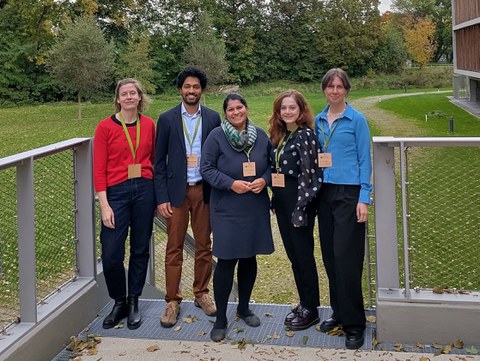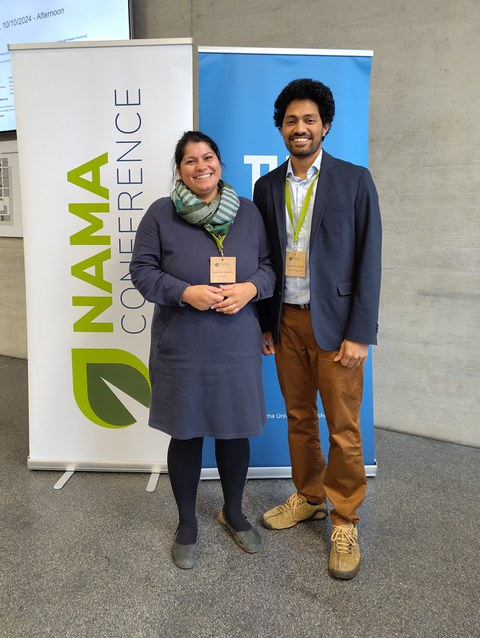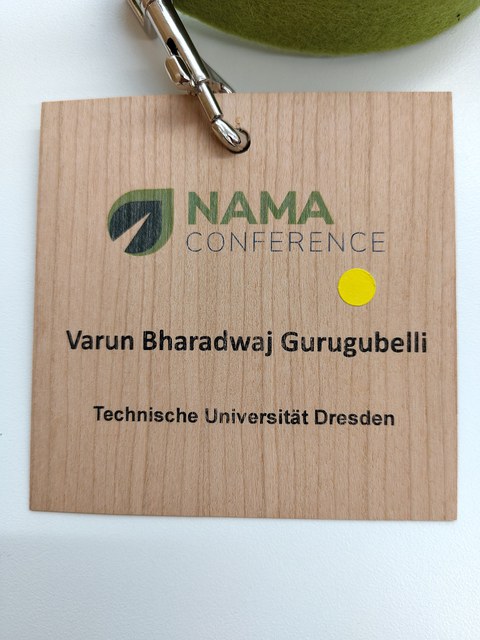Oct 18, 2024
Experts Gather at NAMA 2024 to Explore Sustainability in Management

f.l.t.r.: Varun Bharadwaj Gurugubelli, Jun.-Prof. Samanthi Dijkstra-Silva, Emma Lloyd, Sabrina Schmidt
The NAMA 2024 conference entitled "Management, Technology and Entrepreneurship for Sustainability" took place on October 10 and 11, 2024 at the Campus Straubing for Biotechnology and Sustainability at TU Munich and brought together leading scientists and practitioners to explore the latest topics in sustainability management. NAMA, short for Wissenschaftliche Kommission Nachhaltigkeitsmanagement (WK NaMa), is the Sustainability Management Section of the Association of University Professors of Business Administration (VHB). The event serves as a platform for academics and experts to exchange knowledge about sustainability practices and their impact on the economy and society.

Jun.-Prof. Samanthi Dijkstra-Silva and doctoral student Varun Bharadwaj Gurugubelli
Participants from several European countries, including Germany, Switzerland, the Netherlands, Belgium and Austria, took part in the conference on the banks of the river Danube. TU Dresden had the largest delegation at the event (Photo above, from left to right: Dr Ilka Weissbrod, Varun Bharadwaj Gurugubelli, Jun.-Prof. Samanthi Dijkstra-Silva, Emma Lloyd, Sabrina Schmidt), with the Boysen-TU Dresden- Research Training Group represented by doctoral student Varun Bharadwaj Gurugubelli (Project F5 - Entrepreneurial Impact on Sustainability in the H2 Economy) and his supervisor Jun.-Prof. Dr. Samanthi Dijkstra-Silva (Faculty of Business and Economics, Junior Professorship in Sustainability Assessment and Policy). As an early-career researcher, the scholarship holder received valuable feedback on his presentation and was thus able to advance his research. Productive discussions with other scientists and professors also enabled a valuable exchange of information and new contacts, making the conference a successful experience for the scientist.
In addition to the insightful presentations by the researchers, the conference also featured a keynote speech by Julia Roblick from "better ventures", an impact investing firm. Roblick's talk focused on assessing the impact of early-stage start-ups and offered practical insights into the intersection of sustainability and business. A panel discussion also looked at VHB ratings for academic journals and explored their benefits and limitations for the research community. An attractive supporting program was also provided in Straubing. A conference dinner was held at the NAWAREUM museum, followed by a guided tour of the museum, which has set itself the task of informing the public more comprehensively about the energy and resource transition.

NAMA name tag
A notable feature of NAMA 2024 was its commitment to sustainability in practice, not just in theory. Several eco-friendly initiatives were implemented at the conference, including serving only vegetarian meals, with vegan options also available. No giveaways such as pens, books or bags were distributed to avoid waste. The name badges were collected for reuse after the event, and the name badges printed on wooden plates without the year will be reused for future conferences. These efforts underscored the organizers' commitment to embodying sustainability beyond academic discourse.
Doctoral student Varun Bharadwaj Gurugubelli would like to thank the Friedrich and Elisabeth Boysen-Foundation for making the conference visit financially possible.
